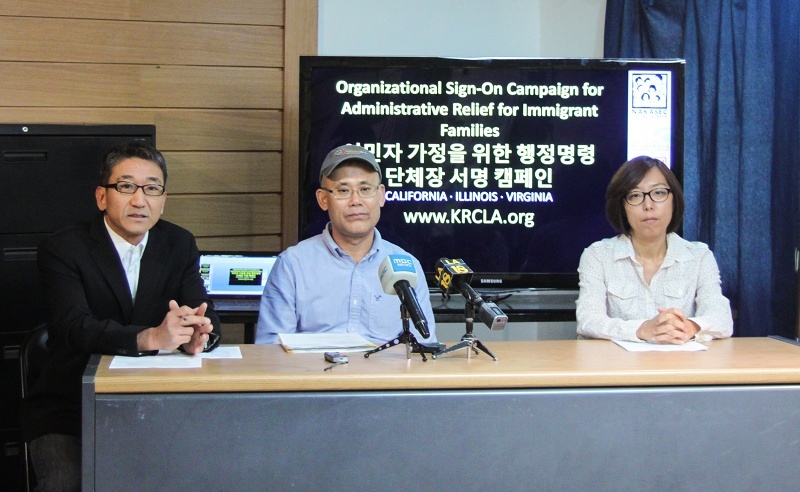
As President Obama's recent announcement that he will act unilaterally to carry out immigration reform has brought about a swirl of controversy, most of the attention has been pointed to the Latino population in the U.S. However, Asian immigration activists have been just as passionate about reform.
"Though immigration is often thought of as a Latino issue, it's also very relevant to Koreans and Asians," Hee-Ju Yoon, the secretary-general of the Korean Resource Center (KRC), said at a press conference on Monday at the KRC office, located in Los Angeles. Indeed, over 1 million of the undocumented immigrant population in the U.S. are Asian as of 2013, and some 2 million immigration cases for Asians are stuck in backlogs.

(From left to right: Dae-Joong Yoon, Sang-Hyuk Chung, and Hee-Ju Yoon) Advocates from the Korean Resource Center (KRC) explain the need for immigration reform at a press conference they hosted on November 17.
The KRC has been providing services and engaging with many Korean families in which some members are or had been undocumented immigrants, and has recently been campaigning to gather signatures on a letter that it plans to send to the President and Congress on Thursday, urging them to help reunite immigrant families. Sang-Hyuk Chung, a community activist at KRC who directly meets with such families, argued that unless the President gives an executive order for the new immigration reforms that he is planning, "there is no hope" for immigrant families.
"I've met many families with undocumented parents or family members, and their lifestyle in and of itself miserable," Chung said. "One of the people I've met said that he would even commit suicide if even this executive order doesn't happen."
Activists for immigration reform place their last hope on Obama's unilateral action because Congress hasn't been showing any signs of passing immigration reform bills anytime soon. Even President Obama himself previously told the U.S. that he does not want to use executive order for immigration reform, but after Congress hasn't given him room to work together to pass a bill, he decided to act unilaterally, according to the New York Times:
"White House officials said the House speaker, John A. Boehner, made it clear that Republicans, who control both chambers in Congress next year, have no intention of passing a bill that the president could agree with. They note that Mr. Obama delayed any executive action throughout 2013 and 2014, hoping that Mr. Boehner would allow a vote in the House on a bipartisan bill that passed the Senate. When that did not happen by the summer, officials said, Mr. Obama decided he should act on his own."
The new measures that President Obama plans to implement include measures to grant legal work permits for undocumented immigrant parents of U.S. citizens or legal permanent residents, and also for those who illegally immigrated into the U.S. under the age of 16. This would grant millions of undocumented immigrants safety from being deported.
Meanwhile, those opposed to such actions from the President are concerned that he is overstepping boundaries of power, and argue that the immigrants who have hard-earned legal immigrant status are negatively affected by those who intentionally come into the country illegally.
"We can't ignore the plight of low-skilled American workers suffering depressed wages and high unemployment in part because of competition from immigrants who came here illegally," wrote Froma Harrop in an opinion piece for the Seattle Times.
"America needs a new page on immigration, and that page can't be turned until we deal with the millions in this country illegally," Harrop continued. "Deporting many, many millions is not going to happen; it's unthinkable. The great majority of unauthorized immigrants are fine people and hard workers. That said, future immigrants must have papers."
Others opposed to granting amnesty to currently undocumented immigrants argue that even with current immigration policies"”which, some argue, are already generous"”there has been a significant decrease in deportations, and the release of criminals as a result of it.
To counter those arguments, President Obama included measures in his soon-to-be implemented plan to prioritize deportation of criminals, and to boost border security.
Though the President has not specified when he would take action, he may do so even as early as Friday this week.
Obama's new measures do not create pathways for citizenship, and may easily be overturned by the new Republican majority Senate, or the next President.

















